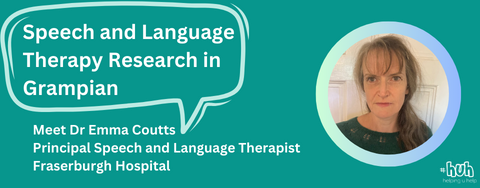I am a speech and language therapist with a specialist interest in communication difficulties caused by stroke. One such difficulty is aphasia. People with aphasia have problems expressing themselves. It can affect understanding and reading as well as speaking and writing. Another difficulty is dysarthria, or slurred speech.
I enjoy the challenge of combining my clinical career with research. My research focusses on people living with communication difficulties following stroke. For example, I looked at how dog ownership impacts on adaptation and quality of life of people with post-stroke aphasia. I found that while having new language problems could present challenges with looking after a dog, many people found that their relationship with their dog brought support and reduced stress.
In 2020, I received an NHS Research Scotland Career Researcher Fellowship. This enabled me to pursue a three-year research programme. This research focussed on people returning to work with post-stroke communication disorders. This is important because around a quarter of people who have strokes are of working age. Communication problems can cause a significant barrier to being able to resume a job. The first step involved a review of the literature on the topic. The second step was an interview study. It was called ConQueSt. The return to work experiences of people with communication disorders post-stroke: a qualitative study. I interviewed people from NHS Grampian, NHS Greater Glasgow & Clyde and NHS Highland. I am currently analysing the findings from the interviews. I hope to use the results to design and test a programme to help people with post-stroke communication difficulties to return to work.
